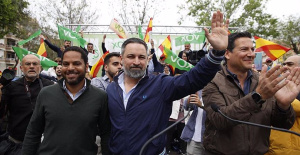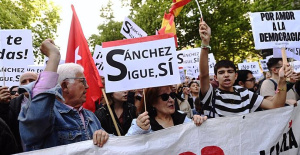The complaint indicates a way to investigate 327 of the 379 unsolved ETA crimes
MADRID, 28 Feb. (EUROPA PRESS) -
The judge of the National Court (AN) Manuel García Castellón has agreed to reopen the investigation into the ETA attack perpetrated in 2000 in Sallent de Gállego (Huesca) that cost the lives of a couple of civil guards, as a result of of a complaint that frames this crime in "a policy of attempted genocide", a way that would make it possible to declare imprescriptible 327 of the 379 unsolved ETA crimes.
In an order from last Monday, to which Europa Press has had access, the head of the Central Investigating Court Number 6 points out that, "deriving from the actions received, evidence by which certain persons could be attributed a participation in the punishable acts investigated, it is appropriate (...) to decree the reopening of the proceedings".
In addition, it notifies the Prosecutor's Office of the complaint filed by the Spanish Association against Impunity and for the Advancement of Human Rights, which is directed against 10 former ETA leaders, "who allegedly made up the top and hierarchical chain of command of the terrorist organization at the time of the events" and that, consequently, they had "fighting control" over it and its actions, which would allow for mediate authorship and commission by omission to be considered.
It is about Ignacio Miguel Gracia Arregui, alias 'Iñaki de Rentería'; Javier García Gaztelu, 'Xapote'; Juan Antonio Olarra Guridi, 'Jokin'; Ainhoa Mugica, 'Olga'; Asier Oyarzabal, 'Baltza'; Juan Carlos Iglesias, 'Gaddafi'; Mikel Albisu, 'Like Mikel'; Vicente Goicoechea, 'Willy'; Ramón Sagarzazu, 'Ramontxo'; and María Soledad Iparraguirre, 'Anboto'.
The National Court has already resumed several investigations into ETA crimes in search of the alleged 'brains', following a series of lawsuits filed by Dignity and Justice (DyJ). The novelty of this complaint lies in the fact that it frames this attack in a "policy of attempted genocide" carried out by ETA through its multiple actions, something that "until now has not been duly recognized before the courts of Justice in Spain".
And from this perspective, said association, created by the lawyer Miguel Ángel Rodríguez Arias --who also represents DyJ--, defends the "impossibility of prescription of these murders of the year 2000, nor of any other ETA murder after May 24 of 1976", that is, "327 of the 379 unpunished murders of ETA".
To reach this conclusion, the association relies on the jurisprudence of the Supreme Court (TS), according to which when there are two related crimes, the limitation period must be that of the most serious, in this case the alleged attempted genocide, which is imposes that of terrorist murder.
This legal reasoning leads him to anchor the expiration period in the crime of genocide --which he defines as imprescriptible--, thus exceeding the term set at the time for terrorist murder, 20 years.
Regarding the legal time to be able to prosecute genocide, the complaint indicates that there is no doubt that in Spain it is an imprescriptible crime at least since the entry into force of the Penal Code (CP) of 1995, on May 24, 1996. .
To this he adds that when the crime of genocide was incorporated into the Spanish Criminal Code, in 1971, its initial statute of limitations was 20 years, which means that all acts constituting genocide that had not expired when the 1995 Criminal Code came into force should be considered imprescriptible.
The complaint, to which Europa Press had access, reasons that this implies that "any act of genocide perpetrated since May 24, 1976 (20 years before, its previous limitation period) was not yet prescribed at the time of passing to be already imprescriptible".
"That is to say: 327 of the total of the 379 ETA murders that are unpunished today would not have actually prescribed, and could be reopened and continue to be investigated at any time, if the prescription of such hundreds of murders and their bankruptcy and related relationship were correctly understood. as part of a policy in the degree of attempted genocide, based on the resolution that may emanate from a case like this", he affirms.
The underlying legal foundation is that the ETA murders "were a means to carry out a broader policy of genocide" that the terrorist organization did not complete but did attempt.
He points to the case of Sallent de Gállego because the two civil guards were murdered -he argues- they were murdered for belonging to the forces of order in charge of protecting the persecuted group. This same week, the association has asked García Castellón that the attack perpetrated on August 4, 2002 in Santa Pola (Alicante), in which a 6-year-old girl, daughter of a civil guard and a man died, should also be investigated from this optic.
"ETA attacks in Sallent de Gállego as part of a very long previous chain, and that would continue later as is evident with the list of completed murders, selective murders and massacres, against the men and women of the Civil Guard and even with respect to their own families", emphasizes the aforementioned association.
In line, he alludes to "the apparent existence and use even, additionally, of 'blank orders to assassinate civil guards whenever there was an opportunity' given from the 'zuba'", the ETA executive committee.
As a characteristic feature of this supposed genocidal policy, Rodríguez Arias also mentions "the expulsion and displacement of a demographically significant part of human beings."
These three circumstances --the existence of a persecuted group, the "selective assassinations" of their leaders and those who protect them, and the forced expulsions-- reveal, for said association, which is based on the parameters set by the UN, "the true nature" of ETA's actions, "usually overlooked".
On the other hand, the complaint refers to the first 52 ETA murders, from that recognized list of 379, which would remain outside the 'Sallent de Gállego doctrine' to maintain that they would also be imprescriptible.
Regarding those 52, the first of which was committed on April 9, 1969, Rodríguez Arias states that they are covered by the ratification by Spain on February 8, 1969 of the Geneva Convention for the Prevention and Punishment of Crime of Genocide, "a crime internationally recognized since its inception as imprescriptible".
"Finally, the situation of the first two ETA murders (taking the total of almost 900), will in turn be clearly different from everything previously said, since both are prior (...) even to said internal publication in BOE on February 8, 1969", he adds.
And he adds, however, that these first two, who had as fatalities the civil guard José Antonio Pardines (June 7, 1968, Villabona) and the policeman Melitón Manzanas (August 2, 1968, Irún), "come to be considered murders." resolved', because not all criminal perpetrators allegedly involved have been sentenced, as implied by the principle of mandatory criminal nature, but at least 'some' criminal responsible intervening".

 Exploring Cardano: Inner Workings and Advantages of this Cryptocurrency
Exploring Cardano: Inner Workings and Advantages of this Cryptocurrency Seville.- Economy.- Innova.- STSA inaugurates its new painting and sealing hangar in San Pablo, for 18 million
Seville.- Economy.- Innova.- STSA inaugurates its new painting and sealing hangar in San Pablo, for 18 million Innova.- More than 300 volunteers join the Andalucía Compromiso Digital network in one month to facilitate access to ICT
Innova.- More than 300 volunteers join the Andalucía Compromiso Digital network in one month to facilitate access to ICT Innova.-AMP.- Ayesa acquires 51% of Sadiel, which will create new technological engineering products and expand markets
Innova.-AMP.- Ayesa acquires 51% of Sadiel, which will create new technological engineering products and expand markets Abascal (Vox) criticizes that Sánchez is "victimizing" himself and calls for elections after his possible resignation
Abascal (Vox) criticizes that Sánchez is "victimizing" himself and calls for elections after his possible resignation Carlos Alcaraz reaches the round of 16 in Madrid without breaking a sweat
Carlos Alcaraz reaches the round of 16 in Madrid without breaking a sweat Some 5,000 people demonstrate in front of Congress for democracy, hours before Sánchez's decision
Some 5,000 people demonstrate in front of Congress for democracy, hours before Sánchez's decision STATEMENT: Intelligent systems used in the construction of the deepest underwater tunnel in China
STATEMENT: Intelligent systems used in the construction of the deepest underwater tunnel in China How Blockchain in being used to shape the future
How Blockchain in being used to shape the future Not just BTC and ETH: Here Are Some More Interesting Coins Worth Focusing on
Not just BTC and ETH: Here Are Some More Interesting Coins Worth Focusing on UPV students build a prototype of a wooden house to move to Equatorial Guinea
UPV students build a prototype of a wooden house to move to Equatorial Guinea The UA opens the call for the Impulso 2024 Awards for the best innovative business initiatives
The UA opens the call for the Impulso 2024 Awards for the best innovative business initiatives ALI, virtual assistant from Alicante, internationally recognized by the OECD
ALI, virtual assistant from Alicante, internationally recognized by the OECD Retrópolis brings the golden age of video games and computing to the UPV
Retrópolis brings the golden age of video games and computing to the UPV A million people demonstrate in France against Macron's pension reform
A million people demonstrate in France against Macron's pension reform Russia launches several missiles against "critical infrastructure" in the city of Zaporizhia
Russia launches several missiles against "critical infrastructure" in the city of Zaporizhia A "procession" remembers the dead of the Calabria shipwreck as bodies continue to wash up on the shore
A "procession" remembers the dead of the Calabria shipwreck as bodies continue to wash up on the shore Prison sentences handed down for three prominent Hong Kong pro-democracy activists
Prison sentences handed down for three prominent Hong Kong pro-democracy activists ETH continues to leave trading platforms, Ethereum balance on exchanges lowest in 3 years
ETH continues to leave trading platforms, Ethereum balance on exchanges lowest in 3 years Investors invest $450 million in Consensys, Ethereum incubator now valued at $7 billion
Investors invest $450 million in Consensys, Ethereum incubator now valued at $7 billion Alchemy Integrates Ethereum L2 Product Starknet to Enhance Web3 Scalability at a Price 100x Lower Than L1 Fees
Alchemy Integrates Ethereum L2 Product Starknet to Enhance Web3 Scalability at a Price 100x Lower Than L1 Fees Mining Report: Bitcoin's Electricity Consumption Declines by 25% in Q1 2022
Mining Report: Bitcoin's Electricity Consumption Declines by 25% in Q1 2022 Oil-to-Bitcoin Mining Firm Crusoe Energy Systems Raised $505 Million
Oil-to-Bitcoin Mining Firm Crusoe Energy Systems Raised $505 Million Microbt reveals the latest Bitcoin mining rigs -- Machines produce up to 126 TH/s with custom 5nm chip design
Microbt reveals the latest Bitcoin mining rigs -- Machines produce up to 126 TH/s with custom 5nm chip design Bitcoin's Mining Difficulty Hits a Lifetime High, With More Than 90% of BTC Supply Issued
Bitcoin's Mining Difficulty Hits a Lifetime High, With More Than 90% of BTC Supply Issued The Biggest Movers are Near, EOS, and RUNE during Friday's Selloff
The Biggest Movers are Near, EOS, and RUNE during Friday's Selloff Global Markets Spooked by a Hawkish Fed and Covid, Stocks and Crypto Gain After Musk Buys Twitter
Global Markets Spooked by a Hawkish Fed and Covid, Stocks and Crypto Gain After Musk Buys Twitter Bitso to offset carbon emissions from the Trading Platform's ERC20, ETH, and BTC Transactions
Bitso to offset carbon emissions from the Trading Platform's ERC20, ETH, and BTC Transactions Draftkings Announces 2022 College Hoops NFT Selection for March Madness
Draftkings Announces 2022 College Hoops NFT Selection for March Madness























